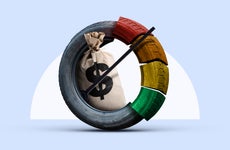Auto equity loans: What they are and who they’re best for

The Bankrate promise
At Bankrate we strive to help you make smarter financial decisions. While we adhere to strict , this post may contain references to products from our partners. Here's an explanation for .
Portions of this article were drafted using an in-house natural language generation platform. The article was reviewed, fact-checked and edited by our editorial staff.
Key takeaways
- An auto equity loan is a type of personal loan that uses your car as collateral.
- These loans can offer a lower interest rate compared to regular personal loans, but your car may be taken back if you can’t keep up with payments.
- Auto equity loans may be a good option for those with equity in their car and in need of funds, but there are also alternatives such as personal loans and credit cards.
- It’s important to budget carefully and make payments on time to avoid losing your car as collateral.
A typical personal loan allows you to borrow money without any collateral — but with an auto equity loan, you can borrow money against the value of your car. Having a secured loan can mean a lower interest rate. However, you should consider the advantages and risks of an auto equity loan before taking one out.
What is an auto equity loan?
An auto equity loan is a type of personal loan where your vehicle serves as collateral. You borrow against your car’s equity. Equity is the difference between the car’s market value and the amount you still need to pay off. You can use this loan for any purpose.
To secure an auto equity loan, the value of your vehicle must be more than the outstanding balance you owe on it.
If your car, for example, is worth $25,000 and you have a loan balance of $10,000, you have $15,000 worth of equity that you can potentially borrow against. With an auto equity loan, you can borrow up to 100 percent of the equity in your car, up to a specified limit.
Because the loan is secured by your vehicle, you will likely be able to get a lower rate than a normal personal loan. However, because your car will be used as collateral, it is at risk of repossession if you don’t make your payments on time.
Auto equity loan vs. car title loan
A car title loan is a short-term loan that uses your vehicle as collateral. More often than not, car title loans are much more expensive than auto equity loans. In comparison, auto equity loans often have longer terms and lower interest rates.
Pros and cons of an auto equity loan
Consider all that an auto equity loan has to offer. Faster approval and potentially lower rates may not outweigh how hard these types of loans are to find.
Pros
- Faster approvals: For those with bad credit, an auto equity loan can mean quick approval. Because you can use the equity in your car as collateral, the bank can ensure that it’s getting its money back.
- Low interest rates: The interest rate you receive on an auto equity loan is connected to your credit score and the value of your car. That means if your car is worth a lot, you may be able to get a good rate, even with less-than-perfect credit. Best Egg, a lender that offers these types of loans, has rates from 8.99 percent and terms up to 60 months.
Cons
- Vehicle is collateral: If you stop making payments, the lender can repossess your vehicle to recoup its losses.
- Hard to find: Auto equity loans are not common. If you are looking to get an auto equity loan, check with your bank or credit union first. They may offer the service, or they may have a partner they can connect you with.
- Limited amounts: As with any equity loan, the amount you can borrow is partially determined by how much equity you have in your car. Someone with a $10,000 car and $5,000 in equity could get up to a $5,000 loan, for example. Someone with a less valuable car might not be able to get a loan at all.
Who an auto equity loan is best for
An auto equity loan may be right for you if you meet the following:
- You have equity in your car: The most important part of being a good candidate for an auto equity loan is having enough equity to take a loan out against.
- You can afford payments: Since your car will be on the line, it’s important to know that you can make payments every month. If you don’t, your vehicle could be repossessed. This can especially be a problem if you need the car daily.
- Interest rates may be lower than what you’re currently getting: In this case, it may make sense to opt for this uncommon loan type rather than something more readily available.
Alternatives to an auto equity loan
If you can’t get an auto equity loan or if the application process isn’t going as smoothly as you would like, you may want to consider loan options that don’t require your car.
Home equity
Much like an auto equity loan, a home equity loan relies on you having equity in your house. Typically, you can borrow up to a percentage of your equity or a predetermined cap. If you own your home, this may be a viable alternative.
Personal loan
Unsecured personal loans are a solid alternative to auto equity loans. However, personal loan rates will likely be higher since they aren’t secured. The process for getting a personal loan is similar to that of getting an auto loan and can be done in person or online..
Credit cards
While they are an alternative, credit cards are usually much more expensive than a personal loan or secured loan. They are, however, also easier to qualify for and you could have instant access to the credit upon approval.
Next steps
An auto equity loan could be a good idea if you need the funds and can find one. But it’s important to budget accordingly. Your vehicle will be at risk if you can’t make payments.
Related Articles



